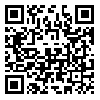BibTeX | RIS | EndNote | Medlars | ProCite | Reference Manager | RefWorks
Send citation to:
URL: http://ijpcp.iums.ac.ir/article-1-2826-en.html
2- Deparment of Psychology and Education of Exceptional Children, Faculty of Psychology and Educational Science, University of Tehran, Tehran, Iran. ,
Objectives This study examined the effectiveness of Child-Centered Play Therapy (CCPT) on the internalized and externalized behavioral problems of children with Cerebral Palsy (CP).
Methods This was a quasi-experimental with a pre-test, post-test and a follow-up design. The study population consisted of all 6-8 years old children with CP in Rafideh Rehabilitation center in Tehran, Iran. Thirty children with CP were randomly divided into two groups of control (n=15) and experimental (n=15). Behavioral problems were measured using Child-Behavior Inventory Test in pre-test, post-test and follow-up phases. CCPT was performed for 16 sessions twice a week in the experimental group. After three months of CCPT intervention, the follow-up test was conducted to examine the continuity, consolidation, and generalization of the intervention results. The obtained data were analyzed by repeated-measures Multivariate Analysis of Covariance (MANCOVA).
Results In the post-test phase, CCPT had significant effect on reducing anxiety, depression, offense, and aggression of the children with CP compared to the pre-test scores.
Conclusion Given the significant effect of CCPT on reducing the internalized and externalized behavioral problems of children with CP, the results can be used in the pediatric care centers for these children.
Received: 2018/08/15 | Accepted: 2019/05/7 | Published: 2019/10/1
| Rights and permissions | |
 |
This work is licensed under a Creative Commons Attribution-NonCommercial 4.0 International License. |






